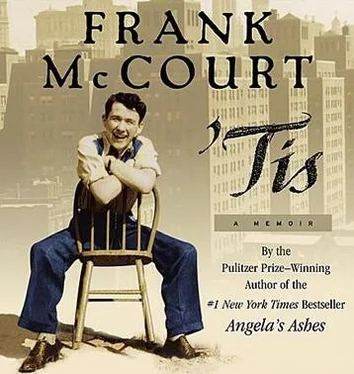Frank McCourt - 'Tis
Здесь есть возможность читать онлайн «Frank McCourt - 'Tis» весь текст электронной книги совершенно бесплатно (целиком полную версию без сокращений). В некоторых случаях можно слушать аудио, скачать через торрент в формате fb2 и присутствует краткое содержание. Жанр: Старинная литература, на английском языке. Описание произведения, (предисловие) а так же отзывы посетителей доступны на портале библиотеки ЛибКат.
- Название:'Tis
- Автор:
- Жанр:
- Год:неизвестен
- ISBN:нет данных
- Рейтинг книги:3 / 5. Голосов: 1
-
Избранное:Добавить в избранное
- Отзывы:
-
Ваша оценка:
- 60
- 1
- 2
- 3
- 4
- 5
'Tis: краткое содержание, описание и аннотация
Предлагаем к чтению аннотацию, описание, краткое содержание или предисловие (зависит от того, что написал сам автор книги «'Tis»). Если вы не нашли необходимую информацию о книге — напишите в комментариях, мы постараемся отыскать её.
'Tis — читать онлайн бесплатно полную книгу (весь текст) целиком
Ниже представлен текст книги, разбитый по страницам. Система сохранения места последней прочитанной страницы, позволяет с удобством читать онлайн бесплатно книгу «'Tis», без необходимости каждый раз заново искать на чём Вы остановились. Поставьте закладку, и сможете в любой момент перейти на страницу, на которой закончили чтение.
Интервал:
Закладка:
I think you’re right, Professor.
Oh, he thinks I’m right. And, Mr. Katz, what do you say to that?
I guess I agree, Professor. I don’t know too many Irish.
Ladies and gentlemen, you must consider what has just been said by Mr. McCourt and Mr. Katz. Here we have the intersection of the Celtic and the Hebraic, both ready to accommodate and compromise. Isn’t that right, Mr. McCourt, Mr. Katz?
We nod and I remember what my mother used to say, A nod is as good as a wink to a blind horse. I’d like to say this to the professor but I can’t take the risk of offending him with all the power he has to keep me from the American dream and make me look foolish before the class, especially the girls.
Monday and Wednesday mornings in the fall term Professor Middlebrook teaches the Literature of England. She mounts the little platform, sits, places the heavy textbook on the desk, reads from it, comments and looks at the class only to ask an occasional question. She starts with Beowulf and ends with John Milton who, she says, is sublime, somewhat in disfavor in our time but his day will come, his day will come. Students read newspapers, work at crossword puzzles, pass notes to each other, study for other courses. After my all-night shifts at various jobs it’s hard to stay awake and when she asks me a question Brian McPhillips jabs me with his elbow, whispers the question and the answer and I stammer it back to her. Sometimes she mutters into the textbook and I know I’m in trouble and that trouble takes the form of a C at the end of the term.
With all my latenesses and absences and falling asleep in class I know I deserve a C and I’d like to tell the professor how guilty I feel and if she failed me completely I wouldn’t blame her. I’d like to explain that even if I’m not a model student she should see the way I am with the Literature of England textbook, all excited reading it in the NYU library, on subway trains, even on piers and warehouse platforms during lunch hour. She should know I’m probably the only student in the world who ever got into trouble with men on warehouse platforms over a literature book. The men taunt me, Hey, look at the college boy. Too good to talk to us, eh? and when I tell them about the strangeness of the Anglo-Saxon language they tell me I am full of shit, that isn’t English at all and who the fuck do you think you’re kiddin’, kid? Maybe they never went to college, they say, but they aren’t gonna have the wool pulled over their eyes by a half-ass shithead just off the boat from Ireland telling them this is the English language when you could see there isn’t an English word on the whole goddam page.
After that they won’t talk to me and the platform boss shifts me inside to run the elevator so that the men won’t be pulling tricks on me, dropping loads to jerk the arms out of my sockets or pretending to run me down with forklift trucks.
I’d like to tell the professor how I look at the authors and poets in the textbook and ask myself which of them I’d like to have a pint with in a Greenwich Village pub and the one that stands out is Chaucer. I’d buy him a pint anytime and listen to his stories about the Canterbury pilgrims. I’d like to tell the professor how much I love the sermons of John Donne and how I’d like to buy him a pint except that he was a Protestant priest and not known for sitting in taverns knocking back the pint.
I can’t talk about this because it’s dangerous to raise your hand in any class to say how much you love anything. The professor will look at you with a pitying little smile and the class will see that and the pitying little smile will travel around the room till you feel so foolish the face turns red and you promise you’ll never love anything in college again or if you do keep it to yourself. I can say this to Brian McPhillips sitting next to me but someone in the seat before me turns and says, Aren’t we being a little paranoid?
Paranoid. That’s another word I have to look up with the way everyone at NYU uses it. From the way this student looks at me with his superior left eyebrow nearly up to his hairline I can only guess he’s accusing me of being demented and there’s no use trying to answer him till I find out what that word means. I’m sure Brian McPhillips knows what that word means but he’s busy talking to Joyce Timpanelli on his left. They’re always looking at each other and smiling. That means there’s something going on and I can’t bother them with the word paranoid. I should carry a dictionary and when anyone throws a strange word at me I could look it up on the spot and shoot back with a smart answer that would collapse the superior eyebrow.
Or I could practice the silence I learned in the army and go my own way which is the best thing of all because people who torment other people with strange words don’t like it when you go your own way.
Andy Peters sits next to me in Introduction to Philosophy and tells me about a job in a bank, Manufacturer’s Trust Company down on Broad Street. They’re looking for people to work with personal loan applications and I could choose a four to midnight shift or a midnight to eight A.M. He says the best thing about this job is once you finish the work you can leave, that no one works a full eight hours.
There’s a typing test and I have no trouble with that because of the way the army dragged me away from my dog and made me a company clerk typist. The bank says, Okay, I can work the four to midnight shift so that I can take my classes in the morning and sleep at night. Wednesdays and Fridays I have no classes and I can shape up at the warehouses and piers and make extra money against the day my brother Michael is out of the air force and the allotment to my mother ends. I can put the Wednesday-Friday money in a separate account and when the time comes she won’t have to be running to the St. Vincent de Paul Society for food or shoes.
There are seven women and four men on the shift at the bank and all we have to do is take piles of applications for personal loans and send notices to the applicants that they’ve been accepted or rejected. Andy Peters tells me during a coffee break that if I ever see an application from a friend that’s been rejected I can change it to acceptance. There’s a little code the daytime loan officers use and he’ll show me how to alter it.
Night after night we see hundreds of applications for loans. People want them for new babies, vacations, cars, furniture, consolidation of debts, hospital expenses, funerals, decorating apartments. Sometimes there are letters attached and if there’s a good one we all stop typing and read them back and forth. There are letters that make the women cry and the men want to cry. Babies die and there are expenses and would the bank help. A husband runs away and the applicant doesn’t know what to do, where to turn. She never had a job in her life, how could she with raising three kids, and she needs three hundred dollars to tide her over till she finds work and a cheap baby-sitter.
One man promises that if the bank loans him five hundred dollars they can take a pint of his blood every month for the rest of his life and it’s a good deal, he says, because he has a rare blood type which he’s not ready to divulge at this moment but if the bank helps him out they’re getting blood that’s as good as gold, the best collateral in the world.
The blood man is rejected and Andy lets it pass but he changes the code for the desperate woman with the three kids who was rejected for having no collateral. Andy says, I don’t understand how they can give loans to people who want to spend two weeks lying on the sand at the goddam Jersey shore and then turn down a woman with three kids hanging on by her fingernails. This, my friend, is where the revolution starts.
Читать дальшеИнтервал:
Закладка:
Похожие книги на «'Tis»
Представляем Вашему вниманию похожие книги на «'Tis» списком для выбора. Мы отобрали схожую по названию и смыслу литературу в надежде предоставить читателям больше вариантов отыскать новые, интересные, ещё непрочитанные произведения.
Обсуждение, отзывы о книге «'Tis» и просто собственные мнения читателей. Оставьте ваши комментарии, напишите, что Вы думаете о произведении, его смысле или главных героях. Укажите что конкретно понравилось, а что нет, и почему Вы так считаете.












